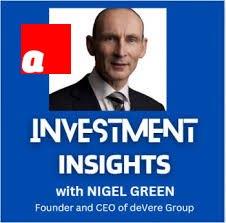
Top 3 Ways To Protect Your Investments Amid Market Slide
Global markets are showing the strain after an extended period of exuberance, and the sudden shift in mood has unsettled investors who had come to expect uninterrupted gains across AI and tech, gold, cryptocurrencies, and equities.
The turn has been swift. Gold has given back a meaningful portion of its late-October surge, bitcoin has slipped under $90,000, and equity markets worldwide have recorded several sessions of broad declines.
The MSCI world index has fallen over multiple consecutive days, an indication that the pressure is not confined to a single asset class.
The underlying reasons are not mysterious. Valuations, especially in AI and tech, had been stretched. Global data has softened in places where resilience had been assumed.
Meanwhile, expectations around December policy from the Federal Reserve
action have shifted with striking speed. A rate cut once regarded as close to certain is now regarded as far from assured. When assumptions move that sharply, markets react accordingly.
Periods like this often highlight a difficult truth: many investors anchor their decisions to momentum rather than structure.
When prices rise, conviction grows. When prices fall, that conviction evaporates at a pace that has little to do with long-term fundamentals.
A week of turbulence becomes a catalyst for rash decisions, despite the fact that such episodes are a normal part of investing.
The correction doesn't signal a deeper breakdown. It signals an adjustment and, also, opportunity.
The themes that powered markets through the year had run far ahead of themselves, and the scale of the pullback reflects that. Investors should treat this phase as a test of discipline, not as a summons to abandon strategy. Three principles deserve particular attention.
1. Diversification must remain the core of portfolio construction
Broad declines across gold, crypto, AI and tech, and wider equities have exposed the risks taken by investors who concentrated too heavily in a narrow set of ideas. The belief that a single theme could carry an entire portfolio through every environment was never sustainable. A downturn becomes far more damaging when the portfolio lacks genuine balance.
Diversification is frequently presented as a static concept, but its relevance is most visible during periods like this. Breadth allows one part of the portfolio to absorb weakness while another offers stability or opportunity.
Markets are delivering a reminder that concentration magnifies both gains and losses, and investors who rely on a single driver must accept the volatility that comes with that choice. Those who built a wider structure across sectors, asset classes, regions, and even currencies, have more room to manoeuvre during stress.
2. Rebalancing should bring structure back to centre stage
The ease with which investors allow portfolios to drift away from their intended balance is striking, especially after a strong run in AI and tech and in alternative assets.
Gains are allowed to compound unchecked, and exposure becomes misaligned with the original plan. Then a pullback arrives, and the consequences become obvious.
Rebalancing is the mechanism that restores discipline. It converts past gains into future resilience. It also turns volatility into a source of selective opportunity.
When markets rise too far too quickly, trimming reduces future vulnerability. When markets fall too far too quickly, a careful shift into undervalued assets sets up future growth.
This process does not require perfect timing; it requires clarity about the role each asset plays within the portfolio.
Investors who treat rebalancing as an administrative formality underestimate its importance. It's one of the most effective tools for improving outcomes during uncertain periods, particularly when sentiment shifts abruptly.
3. Independent advice is invaluable
Market narratives change rapidly during selloffs. Every decline produces a new storyline, and investors are tempted to respond immediately.
The shift into cash becomes the default reaction for many, even when it does little to protect long-term objectives. Cash doesn't offer growth, and its appeal often stems more from anxiety than strategy.
Independent advice provides distance from short-term emotion. A professional can distinguish between legitimate risks and momentary overreaction, identify genuine dislocations, and reinforce structure when uncertainty rises.
Investors frequently underestimate how much the quality of decisions improves when influenced by objective analysis rather than market noise.
This period requires that level of guidance. It is not a crisis; it's a readjustment of expectations after an extraordinary year. Investors with access to informed perspective are far better positioned to respond with consistency rather than impulsiveness.
Remember that the current environment is not an indictment of long-term investing. It's a natural response to excessive optimism, stretched valuations, and shifting assumptions about policy.
Markets are revising prices, not rewriting the entire story. Investors who remain invested, committed to diversification, disciplined rebalancing, and independent advice will treat this episode as part of the cycle rather – with opportunities embedded – than a rupture in it.
Nigel Green is deVere CEO and Founder
Also published on Medium.
Notice an issue? Arabian Post strives to deliver the most accurate and reliable information to its readers. If you believe you have identified an error or inconsistency in this article, please don't hesitate to contact our editorial team at editor[at]thearabianpost[dot]com. We are committed to promptly addressing any concerns and ensuring the highest level of journalistic integrity.
Legal Disclaimer:
MENAFN provides the
information “as is” without warranty of any kind. We do not accept
any responsibility or liability for the accuracy, content, images,
videos, licenses, completeness, legality, or reliability of the information
contained in this article. If you have any complaints or copyright
issues related to this article, kindly contact the provider above.
















Comments
No comment